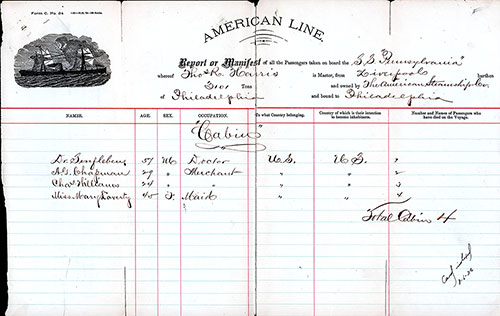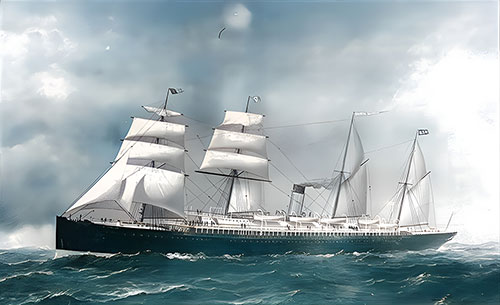20 December 1878 SS Pennsylvania Passenger Manifest (American Line) – Liverpool to Philadelphia (Cabin Class, Capt. Thomas R. Harris)

Form C, No. 34 American Line Report or Manifest of all the Passengers taken on board the SS "Pennsylvania" whereof Thos. R. Harris is Master, from Liverpool, 3,101 Tons, and owned by The American Steamship Co. of Philadelphia and bound to Philadelphia. List included Name, Age, Sex, Occupation, Current Citizenship, Intended Citizenship. | GGA Image ID # 1673e6abdb
🛳️ Castle Garden Passenger Lists – 1878
Overview
Passenger lists from 1878 capture a transitional moment in transatlantic travel and U.S. immigration. Produced either as souvenir lists for travelers or official manifests for port authorities, these records are crucial to understanding both the social experience of ocean travel and the legal process of arrival.
The SS Pennsylvania, operated by the American Line (American Steamship Co. of Philadelphia), was among the first iron transatlantic liners built in the United States. She was a mainstay on the Liverpool–Philadelphia route until 1884, when the American Line was absorbed by the International Navigation Company (owners of the Red Star Line), ending Liverpool service that year.
Souvenir Passenger Lists 🖼️ – Decorative printed booklets given to first-class and cabin travelers, often with ornate covers, advertisements, and company details.
Ship’s Manifests & Reports 📜 – Handwritten or partially printed administrative records created by the ship’s master and submitted to U.S. authorities upon arrival.
Both types are valuable for genealogists, historians, teachers, and collectors, as they preserve names, ages, occupations, and social details not always present in official government arrival registers.
📜 Featured Item: SS Pennsylvania Cabin Manifest (Form C. No. 34)
This surviving document is not a souvenir passenger list, but rather a handwritten master’s manifest excerpt for the SS Pennsylvania, commanded by Capt. Thomas R. Harris.
Form Type: Report or Manifest of All the Passengers (Form C. No. 34)
Printer’s Imprint: “1361-10,28,’78-100 Books” — indicating the blank forms were printed 28 October 1878 in a run of 100 books.
Archival Note: “Card indexed 8-6-36” — added in 1936 during indexing; unrelated to voyage date.
Passengers Recorded: Four U.S. citizens in Cabin Class
- Dr. Senflebeu (57), Doctor, Alsace
- A. B. Chapman (29), Merchant
- Chas. (“Chat”) Williams (24), Merchant
- Miss Mary Laverty (45), Maid
Because this form was printed on 28 October 1878, the excerpt cannot be from earlier voyages that year. It is most likely from the 20 December 1878 arrival or one of the 1879 voyages. Without a legible date, we cannot confirm the exact crossing.
Note: Earlier lower-resolution scans led to a misreading of Chapman’s name as “Bhapruan?”; the corrected name is clear on the high-resoluton scan.
Senior Officers and Staff
- Commander: Captain Thos. R. Harris
Cabin Class Passengers
- Dr. Senflebeu
Male, Age 57, Doctor, US Citizen - A. G. Chapman
Male, Age 29, Merchant, US Citizen - Chas. Williams
Male, Age 24, Merchant, US Citizen - Miss Mary Laverty
Female, Age 45, Maid, US Citizen
✍️ Recorded Cabin Passengers (all U.S. citizens)
- Dr. Senflebeu (57), Doctor, Alsace
- Bhapruan? (29), Merchant
- Chas. (“Chat”) Williams (24), Merchant
- Miss Mary Laverty/Lavertry (45), Maid
This short cabin entry is significant because:
It demonstrates how American Line manifests were recorded and certified upon arrival.
It highlights the importance of Philadelphia as a U.S. immigration port, often overshadowed by New York’s Castle Garden.
It preserves details (age, occupation, nationality) that provide genealogical and social insights into late 19th-century transatlantic travel.

The SS Pennsylvania of the American Line (1873). Built in 1873 at Philadelphia by William Cramp & Sons, the SS Pennsylvania Was One of the First Four Iron Transatlantic Liners Constructed in the United States (Alongside the Ohio, Indiana, and Illinois). She Measured 3,126 Tons and 360 Feet in Length. Operated by the American Line, She Maintained a Liverpool–philadelphia Service Until 1884, When the Company Was Absorbed Into the International Navigation Co., Owners of the Red Star Line. | GGA Image ID # 1674b77e00
📅 SS Pennsylvania Voyages, 1878–1879
To help narrow possibilities, here are known departures and arrivals:
| Departure From Liverpool | Arrival in Philadelphia | Notes |
|---|---|---|
| Apr 24, 1878 | May 3, 1878 | Too early for this form (printed Oct 1878). |
| Jun 5, 1878 | Jun 15, 1878 | Too early. |
| Unknown | July 27, 1878 | |
| Unknown | Sep 7, 1878 | Too early (source discrepancy: Norway Heritage vs. ISTG). |
| Sep 24, 1878 | Oct 19, 1878 | Still before the Oct 28 form imprint. |
| Nov 13, 1878 | Dec 20, 1878 | Earliest possible voyage for this form. |
| Feb 9, 1879 | Unknown | Candidate. |
| Mar 22, 1879 | Unknown | Candidate. |
| Apr 30, 1879 | Unknown | Candidate. |
| Unknown | June 21, 1979 | Candidate. |
| Unknown | Aug. 2. 1879 | Candidate. |
| Unknown | Sept. 20, 1879 | Candidate. |
| Oct 31, 1879 | Unknown | Candidate; late 1879 usage possible. |
📌 Significance of This Document
One of the few surviving handwritten Cabin-class extracts from an American Line manifest.
Demonstrates how blank forms (printed Oct 1878) were reused across voyages.
Contains rare detail (occupation, citizenship) for just four U.S. travelers.
Provides a teaching example of how archival notes (“Card indexed 1936”) differ from original content.
🌍 Historical Relevance
Immigration History: While Castle Garden in New York was the busiest immigration station of the time, ports like Philadelphia also received thousands of newcomers annually. The SS Pennsylvania carried both immigrants and returning U.S. citizens.
Ocean Travel: The document reflects how passengers were divided by class, with Cabin, Second Cabin, and Steerage each recorded separately.
Research Value:
🏫 Teachers & Students – Use this document to illustrate how immigration was tracked before Ellis Island.
🧑🤝🧑 Genealogists – Identify potential ancestors or traveling companions.
📖 Historians – Study the role of American Line vessels in connecting Liverpool with U.S. ports.
🗂️ Collectors – Recognize the rarity of handwritten manifest fragments compared with souvenir passenger lists.
✨ Related Links
American Line Passenger Lists Collection
Philadelphia Immigration Records and Passenger Lists
Castle Garden Immigration Station – Overview
Souvenir Passenger Lists Collection
Norway Heritage S/S Pennsylvania, American Line (External)
Immigrant Ships Transcribers Guild (ISTG) – SS Pennsylvania
(external)
That way, you lead with American Line and Philadelphia-specific material.
Printed on top left of the Manifest: Form C. No. 34 1361-10,28,'78-100 Books. Notation on bottom right: "Card indexed 8-6-36 (6 August 1936)"
🚢 Passenger Classes in the 1870s
| Class | Description | Typical Passengers | Features & Conditions |
|---|---|---|---|
| Cabin (Saloon / First Class) | The highest and most expensive class of travel. Often referred to as the Saloon in passenger lists. | Wealthy travelers, professionals, merchants, diplomats, and U.S. citizens traveling abroad. | Spacious cabins, elegant dining saloon, dedicated stewards, better food and privacy. Often included social activities and comfortable lounges. |
| Second Cabin | Intermediate class, more affordable than Saloon but above Steerage. Sometimes called Intermediate. | Middle-class professionals, students, clergy, teachers, skilled workers. | Smaller shared cabins, less elaborate dining, fewer luxuries, but more privacy and better accommodations than Steerage. |
| Steerage (Third Class) | Lowest cost passage, often in the ship’s hold or between decks. The largest group of travelers. | Immigrants, laborers, families seeking a new life in America. | Crowded sleeping berths, basic meals, limited sanitation. Conditions improved slowly after 1870s but were still harsh compared to other classes. |
📜 Research note: Some names and captions were typed from originals and may reflect period spellings or minor typographical variations. When searching, try alternate spellings and cross-check with related records. ⚓
Curator’s Note
For over 25 years, I've been dedicated to a unique mission: tracking down, curating, preserving, scanning, and transcribing historical materials. These materials, carefully researched, organized, and enriched with context, live on here at the GG Archives. Each passenger list isn't just posted — it's a testament to our commitment to helping you see the people and stories behind the names.
It hasn't always been easy. In the early years, I wasn't sure the site would survive, and I often paid the hosting bills out of my own pocket. But I never built this site for the money — I built it because I love history and believe it's worth preserving. It's a labor of love that I've dedicated myself to, and I'm committed to keeping it going.
If you've found something here that helped your research, sparked a family story, or just made you smile, I'd love to hear about it. Your experiences and stories are the real reward for me. And if you'd like to help keep this labor of love going, there's a "Contribute to the Website" link tucked away on our About page.
📜 History is worth keeping. Thanks for visiting and keeping it alive with me.
